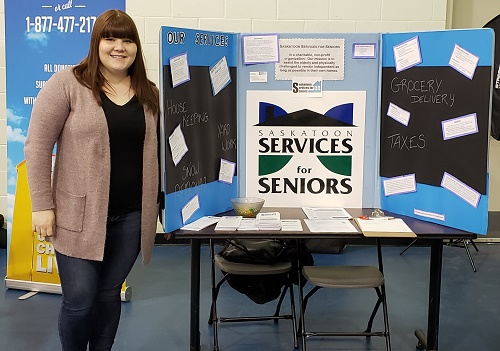SEE Change is producing a series of first-person POV profiles exploring the vast landscape of social enterprises across Canada and beyond. Our goal is to offer content that lets readers discover and learn from other mission-driven organizations, which can prove useful in their own practice. First up: we hear from the acting executive director of a seniors-focused organization based in Saskatchewan, Canada which can serve as a powerful example of how social enterprise can meet critical community needs without waiting for government solutions.
Saskatoon Services for Seniors (SSFS) is a mission-driven, non-profit social enterprise and registered charity. Its business model is designed to provide home support services to lower-income seniors, helping them maximize their independence and safety while aging in place. The agency has been serving the community since 1988, when it transitioned from the Saskatchewan Government’s health department home care division.
The SSFS’ mission is to provide seniors with low-cost, high-impact, “wrap-around” non-medical community supports that enable independent living. As a result, SSFS has built a sustainable, self-funded organization that now serves over 700 seniors annually.
According to research from the National Institute on Aging, more than 90 percent of seniors who live independently want to remain in their homes. Demand is growing for services that support independence for a rapidly aging Saskatchewan population.
To remain successfully in their homes, seniors need a combination of medical support, a physically safe living environment, and social connection. While governments provide health and medical support, practical home supports—essential to physical safety, daily living and emotional supports —are typically not publicly funded. Included are housekeeping, laundry, yard work, snow removal, grocery delivery, and handyman or home maintenance services – all of which are critical in creating a safe and manageable home environment. Finally, seniors need emotional and social well-being support to thrive.
The array of home support ensures daily living is manageable and dignified. They directly impact a senior’s quality of life, safety, wellbeing and ability to remain at home. Without them, even healthy seniors can struggle. In fact, research shows that many preventable hospital admissions stems from unmet non-medical needs.
Unfortunately, accessing these services are often unaffordable for seniors on fixed incomes, frequently unavailable in the community or not tailored to older adults’ “smaller” needs. At SSFS, the volume of daily requests—particularly from low-income seniors—far exceeds our current capacity to respond to the need.
With no core government funding, SSFS meets growing demand through a blend of income-tested service fees, volunteer engagement, and earned-income strategies. Service fees are income-tested so that lower-income clients pay less or are subsidized. A sliding scale pricing model ensures fairness while generating revenue on a “minimum profit” basis. Services are delivered by a mix of paid staff and volunteers.
Overhead is supported through donor contributions, grants, and innovative income-generating approaches such as advertising, community “service-sharing” partnerships (placement students such as social work, nursing, or gerontology students gaining practical experience in home visits), and other non-senior-focused business ventures such pest control (targeted to low-income housing), home safety audits for private clients, and social enterprise consulting to other organizations. SSFS applies an entrepreneurial mindset, continuously seeking new ways to address emerging senior service needs while maintaining new break-even revenue streams.
SSFS also works closely with local organizations, health care providers, service agencies, and volunteer networks to offer a holistic, coordinated, and responsive approach. These partnerships enable us to meet the diverse needs and preferences of older adults in our community by seeing community working together to best utilize limited resources.
In the end, SSFS’ key success factor is a strong alignment between mission and market: solving a real community problem using a financially viable model. There is a mindset on creating lean, entrepreneurial leadership focused on social return, not profit maximization and continuous innovation that connects to senior’s needs.
SSFS is more than a service provider, it’s a powerful example of how social enterprise can meet critical community needs without waiting for government solutions.
Cheryl Loadman is Acting Executive Director of Saskatoon Services for Seniors and a lecturer at the University of Saskatchewan’s Edwards School of Business. She previously worked with the Saskatoon Council on Aging on Age-Friendly initiatives, following 20 years with the Government of Saskatchewan. Much of her career has focused on improving services for low-income seniors, congregate care, seniors’ housing, and addressing bullying and aggressive behaviour in seniors’ residences. She has collaborated on research with the University of Saskatchewan’s College of Nursing and School of Public Health, as well as the University of Regina’s Faculty of Social Work. Cheryl also volunteers in long-term care facilities and coordinates the CRA Volunteer Tax Program for seniors. She holds an MA, BA, BComm, and a Certificate in Adult and Continuing Education, all from the University of Saskatchewan.



